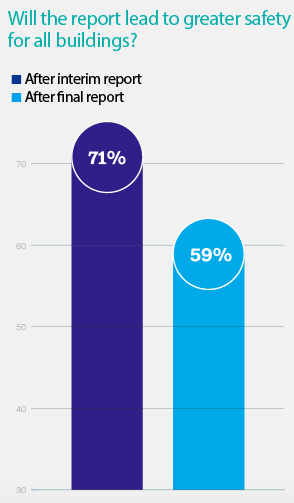The Business Sprinkler Alliance and Building asked readers what changes they expect as a result of the Hackitt review, and how soon these might come. Debika Ray reports on the survey results
Dame Judith Hackitt’s review of building regulations and fire safety was one of the most highly anticipated reports on the industry in recent times. To gauge the response, the Business Sprinkler Alliance and Building conducted two surveys of the magazine’s readers: one after the interim report in December and the other after the launch of the report itself in May. A hundred and fifty people took part.
There was a distinct sense that the final review was not as emphatic as many had hoped. Strikingly, there was a decline in optimism between the two surveys, with only 59% saying the final review would lead to greater fire safety, compared with 71% who said this would be the case after the interim report – a finding that would no doubt disappoint the government.
One of the greatest impacts people predicted was a better system of record-keeping for building materials and decisions

Did Hackitt miss the mark?
Echoing this, 27% said the review missed the mark and needed to go further – while 22% said it accurately reflected the changes needed. This was a reversal on the first survey, when fewer people (14%) said the interim report missed the mark than felt it was spot on (18%).
In both cases, however, most people sat on the fence, saying the reports hit some correct notes but did not go far enough. More encouragingly, only 5% said the Hackitt review would make no difference at all, a drop on the last survey’s 9%.
The report sparked headlines about its failure to ban the combustible cladding many have blamed for the ferocity of the fire at Grenfell Tower last year. Nonetheless, more than half of respondents said that, in the short term, the report would result in a change in the materials used on high-rise buildings, compared with a similar number in the previous survey – perhaps in light of the public outrage over this omission. The same number were also convinced it would lead to an immediate review of Approved Documents, which Hackitt remarked were “complex, ambiguous and not user-friendly”. Others said it would lead to an increase in the use of sprinklers (49%) and fewer desktop assessments (41%). On the latter point, there was a substantial shift from the first survey, when just 28% said they would be eliminated – perhaps because, in April, government launched a consultation on restricting their use.
In the long term, most (66%) believed a formal review of Approved Documents, Building Regulations and the overall Building Act was inevitable, a drop on the previous survey’s 78%. The fall is probably due to the fact the final review did not call for specific changes – which is perhaps why many (39%) predicted short-term confusion over building regulations.
Some 59% predicted a demand for greater professional competence in fire safety (up from 53%) and 56% anticipated stricter enforcement of specifications to ensure materials were not substituted (up from 45%).
Just under half said there were likely to be changes to regulations around retrofitting and refurbishment and further limitations on the use of combustible materials.
One of the greatest impacts people predicted was a better system of record-keeping (61%) – more than the 48% who believed this would come about after the interim report was published. It may reflect Hackitt’s emphasis on a “golden thread” of information through the construction process.
And, like the previous survey, many (54%) warned changes to fire safety practices would mean an increase in building costs.
Cultural shift
For change to occur, the industry needs a cultural transformation. Respondents were asked how long this might take: only 8% believed it would happen within 12 months, while 43% said it would take one to three years, 38% three to five years and 13% up to 10 years. With leading figures in the industry warning another Grenfell could happen tomorrow, many will be hoping it doesn’t take that long.



























No comments yet